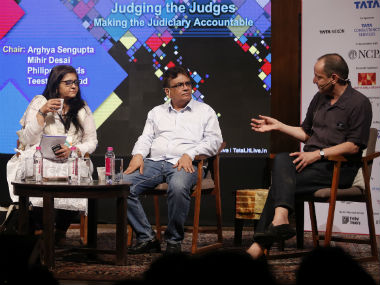The line for a discussion called “Judging the Judges” had no right to be that long. One expected the lawyers to show up for this one and a few intellectuals here and there but the judiciary is really not the topic to grab eyeballs and eardrums.
In addition to that, the discussion was clashing with some of the headline acts of day 3 of the Tata Literature Live. The Experimental Theatre was playing host to Allan Sealy and Jeet Thayil talking on writing to offend while the Godrej Theatre had P Chidambaram and YV Reddy waxing eloquent on whether scams are here to stay.
Why the heavy interest in this discussion then? Chair Arghya Sengupta answered this question early on as he singled out the Supreme Court’s conduct in Judges bribery case and noted that is what had made this discussion exceedingly relevant.
Power and accountability in the judiciary; where are the judges coming from?
Sengupta started off with drawing out the dichotomy of the Supreme Court which, while doing a tremendous amount of good, has also refused RTI applications on itself and passed orders like the one on the National Anthem . This point was taken further by human rights lawyer Mihir Desai, who pointed out the power of the apex court and the many forms of accountability it needs, in terms of appointment of good judges and the transparent functioning of the court.
Senior journalist, educationist and activist Teesta Setalvad gave the talk a broader perspective when she asked where the judges are coming from. This was a nod to the fact that the bar (and thereby the bench) in most of higher judiciary is dominated by a small, close-knit community of lawyers and there was a lack of diversity. She also expanded the discussion to all courts right from the Supreme Court to the district courts.
Then came the surprise package of the panel. Philippe Sands is a well-respected international lawyer but many times the foreigner on a panel on Indian law can just turn into a polite observer while the others discuss the issue. Sands was having none of that. Armed with extremely relevant examples and a world of experience, he was able to inform the debate with a tremendous international perspective.
The discussion then turned to the media and their perceived lack of coverage of the Judges bribery case. Important issues about contempt were raised and the panel seemed fairly united in arguing for getting rid of the contempt law to allow for better examination of the judiciary’s actions.
The problems with judges and lawyers
Setalvad then questioned the “unholy nexus” between the bench (judges) and the bar (lawyers), and the conduct of the lawyers during the Judges bribery case where they resorted to sloganeering and shouted down the petitioner’s lawyer while the judges watched on. She asked why CCTVs couldn’t be installed in the Supreme Court when they were present in the lower courts.
The appointment of judges then came to the fore as Desai mentioned how we only find out about the judges once they have been appointed and there is no public scrutiny done. Sands gave the example of the battle for an ICJ judgeship between India’s Dalveer Bhandari and Great Britain’s Christopher Greenwood where the process has been very transparent. He then talked about the independence of the UK judiciary which is ensured by an independent Judicial Appointments Commission.
On the issue of appointments, Sengupta bemoaned the lack of diversity on the bench and wondered how to ensure that the judiciary is more representative of the people. Setalvad took the question further as she said that the gender, caste and region all currently play a role in the appointment of judges. Pivoting to the post-appointment problems, she asserted that Gujarat was “the best” at treating its judges as they were known to get promotional shares in companies which could possibly be litigants before them.
Sands was visibly stunned at this piece of information as he juxtaposed it with how he once disclosed the fact that he was invited to the marriage of a lawyer representing a party in an arbitration that he was adjudicating.
The panel also waded into the controversy around the Judges bribery case and Sands gave an easily implementable idea to deal with the whole issue which is to randomise the process of assigning cases to judges thereby removing suspicions of bias. He added that the adjudicator’s identity will always influence a judgment and that should be factored in.
Lasting impressions
The discussion stayed on point very well despite three lawyers being on the panel. The audience questions were also intelligent ones as they raised the issues of consistency in judgments, the PIL culture and the post-retirement appointment of judges.
Sands was the star of the show because — while the others mostly talked about that the Indian scenario which might be known to someone with an interest in law — the Franco-British lawyer brought in new facts and perspective which greatly enriched the debate.
That being said, Setalvad and Desai were extremely knowledgeable as well and provided relevant examples in the Indian scenario. Sengupta chaired the discussion well and made sure that it stayed focused.
This was a discussion with coherent and knowledgeable panellists who ensured that while raising pertinent questions, they also answered as many as they could. This all added up to propel this panel to one of the best ones of the event.


)




)
)
)
)
)
)
)
)